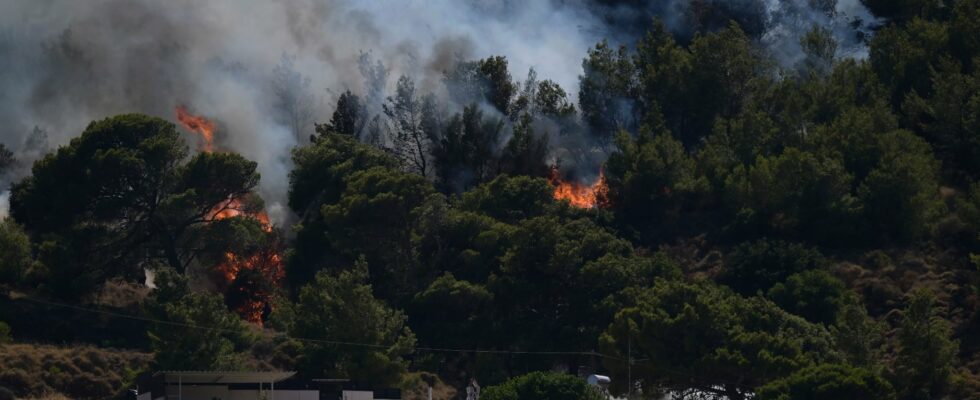Faced with their burning homes, thousands of Greeks have had to agree to evacuate. On the night of Sunday 11 to Monday 12 August, major forest fires broke out in Greece, most of them around Athens. “The civil protection forces fought all night and despite superhuman efforts, the fire continues to spread very quickly and is heading towards Penteli”, explained Vassilis Vathrakogiannis, spokesman for the fire brigade, at a press briefing on Monday morning. At least five new localities were evacuated in the early morning, as well as two hospitals, one paediatric and the other military, in Penteli, about fifteen kilometres north-east of the capital. Twenty-nine hospitalised children were moved to Athenian hospitals, according to the president of the confederation of public hospital employees, Michalis Giannakos.
“We are facing a biblical catastrophe. Our entire municipality is engulfed in flames and is going through difficult times,” Marathon Mayor Stergios Tsirkas, whose 7,000 residents have been forced to leave the town, told Skai TV. The blaze front is now more than 30 kilometres long, according to public broadcaster ERT. A total of 670 firefighters and 183 vehicles have been deployed, and 32 aircraft have been flying over the area since daybreak, Civil Protection Minister Vassilis Kikilias told a news briefing. As of Sunday afternoon, firefighters had managed to control 33 of the 40 fires that had broken out in the past 24 hours. But the blaze continued to spread amid a warning of severe weather conditions for the rest of the week. And the smoke is now covering part of Athens, to the point that the Union of Pulmonologists has warned that people should avoid exercising outdoors, and that pregnant women and vulnerable people should limit their movements.
Other regions of Europe affected
Greece is particularly vulnerable to wildfires this summer, after a particularly dry winter. June and July were the hottest months since records began in 1960. Giorgos Tsevas, 48, from Polydendri, a village near the front of the fires whose name means “many trees” in Greek, was desperate on Sunday: “Everything is burning. I had two hundred olive trees, they are all gone.” Kostas Lagouvardos, a research director at the Athens Observatory, warned on ERTNews on Sunday that the response to the fires must be swift or the fires would get out of control given the current weather conditions. Scientists warn that fossil fuel emissions are worsening the duration, frequency and intensity of heatwaves around the world.
Rising temperatures are leading to a longer wildfire season and an increase in the area burned by wildfires worldwide, according to the UN Intergovernmental Panel on Climate Change. Other parts of Europe are also battling high temperatures this week. In Italy, which is in the grip of one of the worst droughts in 50 years, temperatures are expected to reach 38°C in the shade in Rome on Monday and are unlikely to drop below 36°C this week, with nighttime temperatures struggling to come back down. In the south of the Netherlands, temperatures are expected to range between 32 and 35°C, compounded by high humidity. And in Paris, temperatures are expected to reach 36/38°C.
